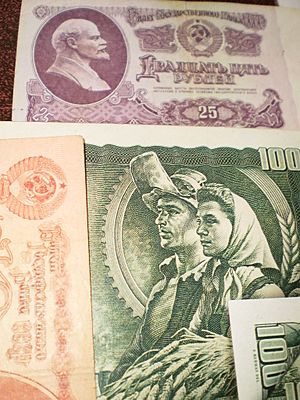Socialist country facts for kids

A socialist country is a nation where the government or the public as a whole has a lot of control over the economy. This means that important businesses and industries, like factories or farms, are often owned or managed by the government. In these countries, the goal is often to share wealth and resources more equally among all citizens. Socialism is a system that stands between capitalism and communism.
Contents
What is a Socialist Country?
In a socialist country, the government plays a big role in how goods are made and shared. Instead of most businesses being owned by private people, they might be owned by the state. This is done to make sure everyone has access to basic needs like healthcare, education, and housing. The idea is to reduce the gap between the rich and the poor.
How is it Different from Other Systems?
Socialism is often compared to other economic systems:
- Capitalism: In a capitalist system, most businesses are owned by private individuals or companies. They aim to make a profit. The government has less control over the economy.
- Communism: Communism is an idea where there is no private property at all. Everything is owned by the community, and there is no government. In practice, countries that called themselves communist often had very strong governments that controlled everything.
Socialism tries to find a middle ground. It allows for some private ownership but also believes the government should step in to help people and control important parts of the economy.
Key Ideas Behind Socialism
Socialism is based on several core ideas:
- Equality: A main goal is to make society more equal. This means trying to ensure everyone has similar opportunities and a fair share of resources.
- Public Ownership: Many socialists believe that important industries, like energy, transportation, or healthcare, should be owned by the public or the government. This way, they can serve everyone, not just those who can pay.
- Social Welfare: Socialist countries often provide strong social safety nets. This includes things like free education, affordable healthcare, and support for people who are unemployed or elderly.
History of Socialist Countries
The idea of socialism became very popular in the 19th century. Many thinkers believed it could solve problems caused by the Industrial Revolution, like poverty and unfair working conditions.
After World War II, several countries adopted socialist systems. Some of these were in Eastern Europe, like the Soviet Union, which was a very large country made up of many smaller republics. Other countries, like Sweden or Norway, also adopted some socialist ideas, but they kept a capitalist economy too. These are sometimes called "social democracies."
Examples of Socialist Countries
Throughout history, many countries have called themselves socialist or have adopted socialist policies.
- Soviet Union (1922-1991): This was a large country that aimed to create a communist society, but it operated as a socialist state with a centrally planned economy. The government controlled almost all industries and farms.
- China (since 1949): China started as a socialist country with a strong government control over the economy. Over time, it has introduced more market-based reforms, but the government still plays a very big role.
- Cuba (since 1959): Cuba has a socialist system where the government controls most of the economy and provides many social services like healthcare and education for free.
- Vietnam (since 1976): Similar to China, Vietnam has a socialist government that has also introduced some market reforms while maintaining state control over key areas.
It's important to remember that not all countries that call themselves "socialist" are the same. They can have very different governments and economies. Some are more democratic, while others have less freedom for their citizens.
See also
 In Spanish: Estado socialista para niños
In Spanish: Estado socialista para niños

